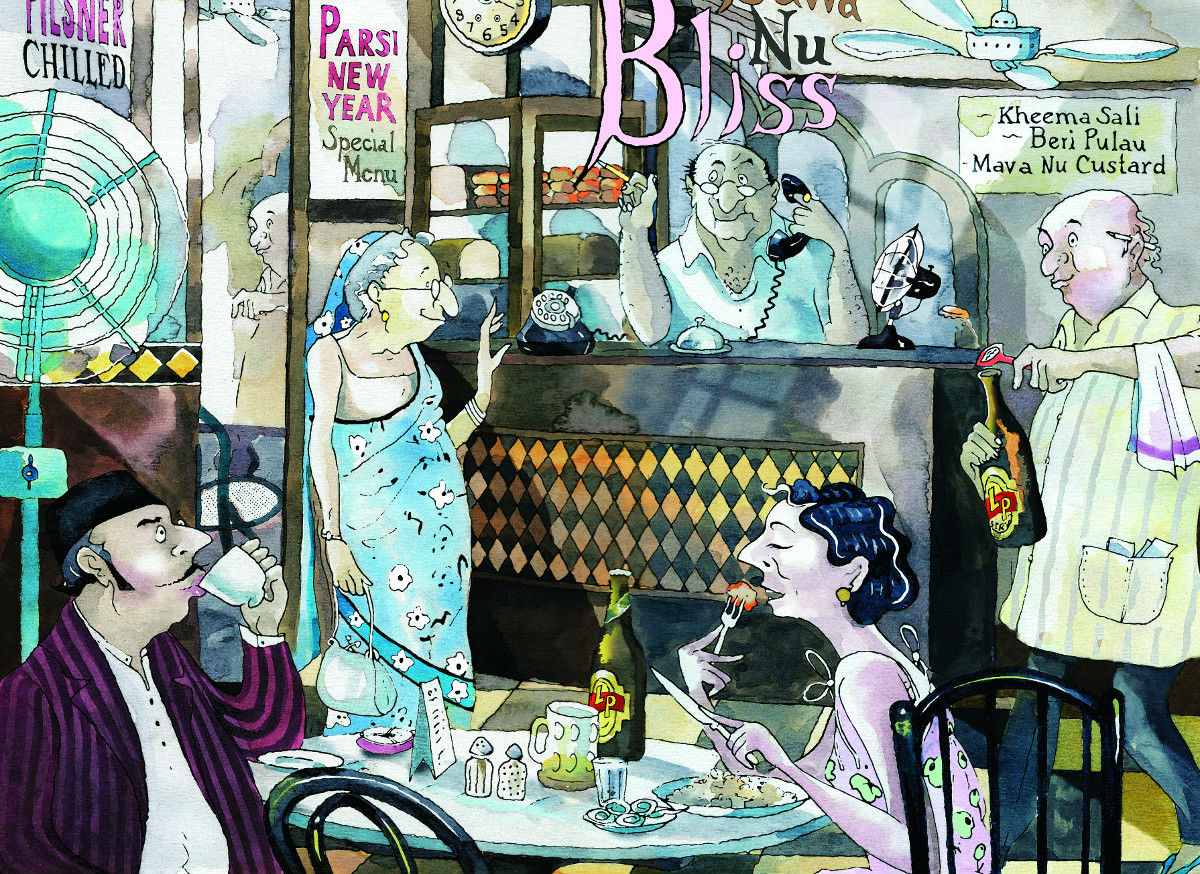This article originally appeared on the April 2019 issue of Travel360 India edition. The illustrations and texts have been taken from the book CoastLine (published by R & J Resource Communications Pvt. Ltd), with permission from the illustrator.
WORDS Paul Fernandes and Chicku Jayadeva FEATURED IMAGE Paul Fernandes
Life in the cities along India’s western shoreline varies starkly in culture and tradition. While Mumbai is glamour central, the home of Bollywood celeb royalty, Goa is equally laid back, where you can party, shop, eat and chill, all in one place. Move further south and Mangaluru awaits with delectable food and clean beaches. We explore the essence of three coastal cities through a few quirky illustrations by Paul Fernandes, one of Bengaluru’s favourite cartoonists.
Journey from Mumbai

Illustration by Paul Fernandes
Paul’s journey begins at Ailha da boa vida or ‘the island of good life’, as he refers to Mumbai, the unforgettable city by the sea. He then meanders southwards, discovering the sights, sounds and the cuisine of Goa before concluding his trip by dancing to wedding bells in Mangaluru! The illustrations are a result of the numerous visits made at different times over a decade.

Illustration by Paul Fernandes
Irani cafés are a part of the landscape of nearly every street corner in South Mumbai. These cafés mostly feature multiple entries, marble-top wooden tables and large mirrors to enhance light and space. While antique ceiling fans keep the restaurant airy, chequered table cloths add to the charm. One may choose from a wide selection of refreshments stored in large glass jars on the counter. Also on display are the day’s freshly baked bread, biscuits and cakes.

Illustration by Paul Fernandes
The Eros Cinema in Churchgate is hard to miss. One of the earliest and finest examples of Art Deco architecture in the Oval Maidan precinct, it was recently included in the UNESCO World Heritage Site list. The Churchgate area also happens to fall along the route of the famous Mumbai dabbawalas (tiffin carriers) who criss-cross the city, delivering home-cooked meals to hundreds of offices daily!

Illustration by Paul Fernandes
According to the Brihanmumbai Electric Supply & Transport Undertaking (BEST), over 10,000 buses transport more than 500,000 people across Mumbai every day. The iconic red double-decker was introduced to Mumbai (then Bombay) in 1937 and till date remain a much-favoured mode of transport availed by all and sundry.

Illustration by Paul Fernandes
Traffic policemen trying to regulate traffic and pedestrians, in this case, shoppers.

Illustration by Paul Fernandes
What the yellow Ambassador car is to Kolkata, the kaali peeli (black and yellow) car is to Mumbai – as iconic as it is essential for the people of the city.

Illustration by Paul Fernandes
The atmosphere around Flora Fountain is one of constant movement, bustle and speed. While office-goers, shopkeepers, tourists, sightseers, hawkers and vendors run past with urgent purpose, and political rallies make their way down the crowded street, only a few stop for a while to give Flora an appreciative glance and enjoy her cool fountain spray – a real blessing on a sunny day in Mumbai.
The essence of Goa

Illustration by Paul Fernandes
Love and laughter seem to permeate the Goan air. Girls dance by in their bright dresses, while young men stand at open windows, serenading passing women with sultry, romantic tunes. During tourist season, the streets of this coastal town come alive with pop-up art galleries, boutiques and restaurants offering their best fare.

Illustration by Paul Fernandes
The peace of the afternoon is shattered by the shrill hooting of the poder’s (bread seller’s) horn, announcing the arrival of fresh hot poi (local bread). This melt-inyour-mouth crusty bread is made in mud ovens.

Illustration by Paul Fernandes
The famed tropical monsoon brings out some of the best and funniest sights in Goa!

Illustration by Paul Fernandes
Goan cuisine is the outcome of decades of collaboration between the British, the locals and the assorted passers-by. African, Arab, Brazilian, Asian, French, Konkan, Malabari, Malaysian and, of course, Portuguese influences have contributed in greater or lesser measure to what we know as the food of Goa.

Illustration by Paul Fernandes
Shopping for vegetables (as in the image) and spices is an integral part of a Mangalorean wedding ceremony.
A Mangalorean wedding

Illustration by Paul Fernandes
A Mangalorean Catholic wedding ceremony is a colourful get together of near and distant relatives. On the big day, the seating arrangements are laid out and the bride is dressed in the traditional bazu (blouse) and kitgi (half saree), which is not tucked in the waist but bunched with a ribbon and spread out like a fan. After the guests have arrived, the bride is led to her seat of honour, following which, the attendees join to sing the voyos (songs) that assures the bride that although she is going to her in-laws’ house, her family will always stay by her side. The celebrations are followed by a hearty feast.

Illustration by Paul Fernandes
One of the highlights of a Mangalorean Christian wedding, next to the feast, is the music. After the wedding cake is cut, the DJ takes over to entertain the guests. The song is chosen and within no time everyone joins in. First comes the Grand March followed by the birdie dance, foxtrot and the waltz.

Illustration by Paul Fernandes
The traditional Catholic wedding is a three-day extravaganza and the events typically include the roca, celebrated on the evening prior to the wedding, the nuptial day and a reception.

Illustration by Paul Fernandes
One of the roads from Goa to Mangaluru snakes through the thick forests of Kudremukh where, if you’re lucky, you may just spot a tiger!

